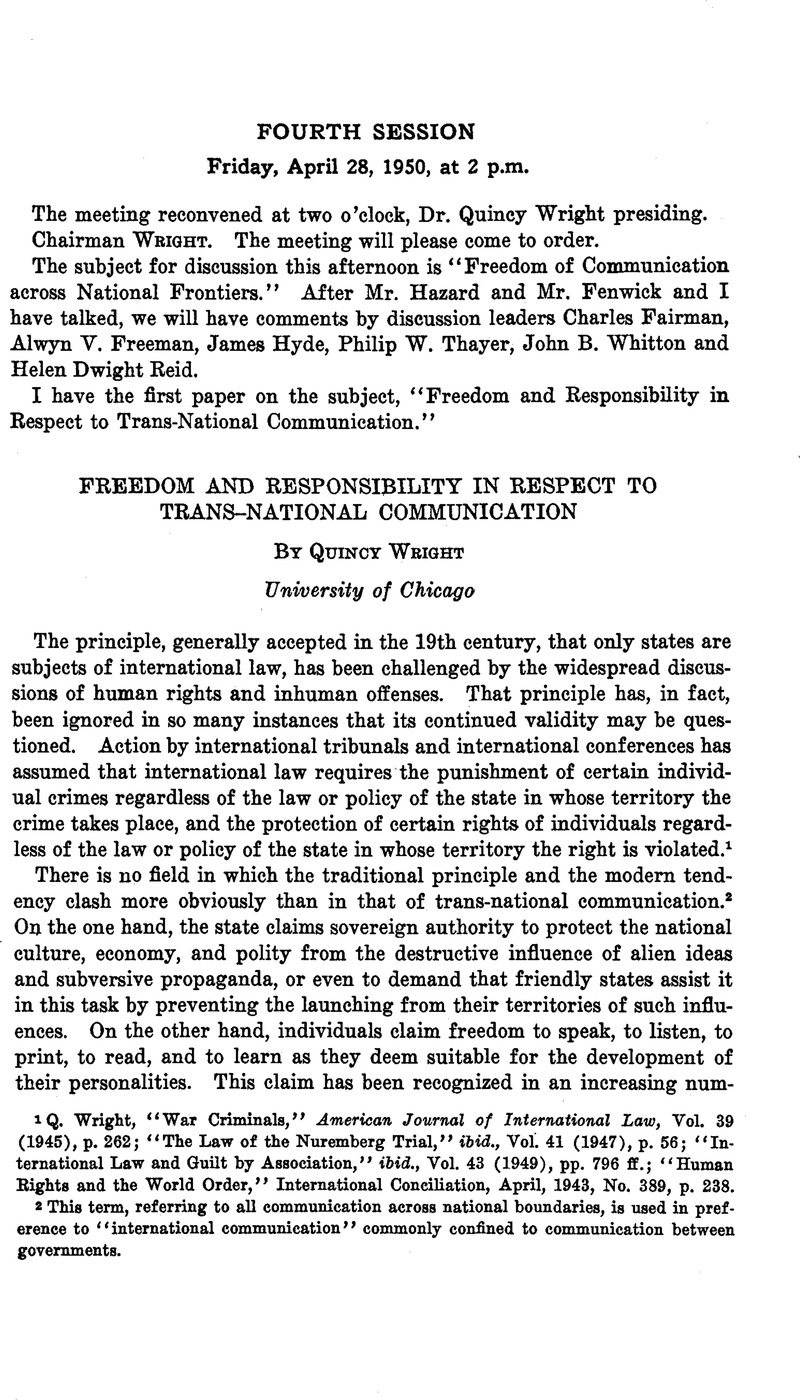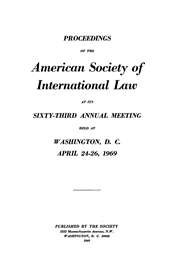No CrossRef data available.
Article contents
Freedom and Responsibility in Respect to Trans-National Communication
Published online by Cambridge University Press: 27 February 2017
Abstract

- Type
- Fourth Session
- Information
- Proceedings of the American Society of International Law at its annual meeting (1921-1969) , Volume 44 , 1950 , pp. 95 - 107
- Copyright
- Copyright © American Society of International Law 1950
References
1 Wright, Q., “ War Criminals,” American Journal o f International Law, Vol. 39 (1945), p. 262;Google Scholar “ The Law o f the Nuremberg Trial,” ibid., Vol’. 41 (1947), p. 56; “ International Law and Guilt by Association,” ibid., Vol. 43 (1949), pp. 796 ff.; “ Human Bights and the World Order,” International Conciliation, April, 1943, No. 389, p. 238.
2 This term, referring to all communication across national boundaries, is used in preference to “ international communication” commonly confined to communication between governments.
3 Constitution of U.S.S.B., 1936, Art. 125: “ In conformity with the interests of the working people, and in order to strengthen the socialist system, the citizens of the U.S.S.B. are guaranteed by law: a) freedom of speech; b) freedom of the press; e) freedom of assembly, including the holding of mass meetings; d) freedom of street processions and demonstrations. These civil rights are ensured by placing at the disposal of the working people and their organizations printing presses, stocks o f paper, public buildings, the streets, communication facilities and other material requisites for the exercise of these rights.” Amendment 1 o f the U. S. Constitution reads: “ Congress shall make no law respecting an establishment of religion, or prohibiting the free exercise thereof; or abridging the freedom of speech, or of the press; or the right of the people peaceably to assemble, and to petition the government for a redress of grievances. ”
4 Palma, Samuel De,U. S. Dept, of State Bulletin, Vol.21, No. 541 (Nov. 14, 1949),p. 740. Google Scholar
5 On the Indians, Sec. 3, par. 12 (Carnegie ed.), p. 157.
6 The Law of Nations, Book II, Chap. 4, secs. 60, 61 (Carnegie ed.), p. 133.
7 Condliffe, J. B. (ed.),Problems of the Pacific, 1929 (Proceedings, 3rd Conference,Institute of Pacific Eelations; Chicago, 1930), p. 5.Google Scholar
8 Ibid., p. 31.
9 Jefferson, Thomas, First Inaugural. Google Scholar
10 Jr.Chafee, Zechariah,, “ Freedom and Fear,” American Association of University Professors, Bulletin, Autumn,1950, Vol. 35, pp. 397 ff.CrossRefGoogle Scholar
11 Cushman, R. E., “Civil Liberty After the War,” American Political Science Review,Vol. 38 (1944), pp. 1 CrossRefGoogle Scholar ff.; “ Freedom versus Security,” Bulletin of the Atomic Scientists, Vol. 5 (1949), p. 69.
12 ‘ < When men have realized that time has upset many fighting faiths, they may come to believe even more than they believe the very foundations of their own conduct that the ultimate good desired is better reached by free trade in ideas—that the best test of truth is the power of the thought to get itself accepted in the competition of the market,and that truth is the only ground upon which their wishes safely can be carried out.” Holmes, J., dissent in Abrams v. U.S.(1919), 250 U. S. 616, 630 Google Scholar. See also Wright, Q. ,A Study of War (Chicago, 1942), pp. 176 ff., 620 ff.Google Scholar
13 See Wright, Q, Mandates Under the League of Nations (Chicago, 1930), pp. 231 ff.Google Scholar
14 ‘ Socrates. We have to consider whether it is right or not for me to try to get away when Athens has not set me free… . It can never be a good thing to do wrong, not even in revenge, nor to return evil for evil in self-defense… . Do you imagine that a city can stand and not be overthrown, when the decisions of the judges have no power? … If we (the laws) mean to kill you because we think it just, must you do your best to kill us in your turn? It is not lawful to use force against father or mother, and still less against our fatherland. What shall one say to this, Crito? That the laws speak the truth or not? Crito. I believe they do.” (Plato, Crito, secs. 9-12, Everymans ed., Socratic Discourses, pp. 356-60.)
15 “ I, however, can not live without liberty. I must not fight for it, since Jan Masaryk can not, even indirectly, attack Russia and its government. I consider myself the trustee of your promises which I forwarded to President Benes. I consider myself a hostage and—before my conscience responsible for the keeping of your promises.” (Letter dated March 3, 1948, attested by Ivan Kryloff to have been found on Masaryk's desk after his suicide, forwarded to Stalin, and taken by Kryloff, an employee o f the Politburo, on his desertion to Germany, where it was published Feb. 4, 1950.)
16 Schenek v. U. S. (1919), 249 U. S. 47. See also Abrams case, above, note 12. it “
17 No one ought to be disturbed on account o f his opinions, even religions, provided their manifestation does not derange the public order established by law. (Art. 10) The Tree communication o f ideas and opinions is one of the most precious o f the rights of man; every citizen then can freely speak, write and print, subject to responsibility for the abuse of the freedom in the cases determined by law. (Art. 1 1 ) ” (Promulgated 1789, incorporated in Constitution of Sept. 3, 1791, Duvergier, Lois, Vol. 3, p. 240.)
18 Chafee, Zechariah, Freedom of Speech Google Scholar. See brief resumes in Encyclopedia of the Social Sciences by Landis, James M.( “ Freedom of Speech and the Press” )Google Scholar and Theodore, F. T.Plucknett ( “ Libel and Slander” )Google Scholar
19 Moore, J. B.,Digest of International Law,Vol. 2, p. 166. Google Scholar
20 Vernon, Van Dyke,“The Eesponsibility of States for International Propaganda,”American Journal of International Law, Vol. 34 (1940), pp. 58 Google Scholar ff.; Wright, Q., “The Crime of War-Mongering,” ibid., Vol. 42(1948), pp. 128 ff.Google Scholar
21 Hudson , Manley O.(ed.), International Legislation, Vol. 7,p. 409. Google Scholar
22 United Nations Weekly Bulletin, Nov. 11, 1947, p. 618.
23 Above note 19. Green Haekworth, Digest of International Law, Vol. 2, p. 146; C. C. Hyde, International Law (Boston, 1945), p. 708.
24 Horowitz v. U. S. (1933), 63 F. (2d) 706 ff.; Haekworth, Digest, Vol. 2, p. 191.
25 Harvard Research Draft Convention on Diplomatic Privileges and Immunities, Art 14, Draft Convention on Legal Position and Functions o f Consuls, Arts. 11 (d ) , 12, 13;American Journal o f International Law,Supp., Vol. 26 (1932), pp. 79, 195-197.
26 Moore, ,Digest, Vol. 4, pp. 574 ff.Google Scholar
27 See Convention on the Privileges and Immunities of the United Nations, 1946, secs.9, 10, 12, 18 (a ) , 22 (d ) , Martin Hill, Immunities and Privileges o f International Officials(Washington, 1947), pp. 226 ff .; American Journal o f International Law, Supp.,Vol. 43 (1949), pp. 3 ff.
28 Haekworth, Digest, Vol. 4, pp. 419 f f . ; C. Van Vollenhoven, Diplomatic Prerogatives of Non-Diplomats, American Journal o f International Law, Vol. 19 (1925), p. 469.
29 The Agreement between the United Nations and the Government of the United States (1946) assures access of news agencies to the United Nations (sec. 11); Hill, op. cit., p.236; American Journal o f International Law, Supp., Vol. 43 (1949), p. 11.
30 U.N. Charter, Arts. 55, 56.
31 Ibid., Art. 2, par. 7.
32 1.C.J. Reports, 1950, p. 65; U.N. Bulletin, Vol. 8 (April 15, 1950), p. 339.
33 Tunis Nationality Decrees Case, World Court Reports, Vol. 1, pp. 156 ff.
34 Vernon , Van Dyke, “The Responsibility o f States for International Propaganda,” American Journal of International Law, Vol. 34 (1940), p.73. Google Scholar See also Moore, ,Digest,Vol. 2, pp. 161 ff.;Google Scholar Hackworth, Digest, Vol. 2, pp. 140 ff.
35 Wright, , Q.“The Crime of War-Mongering, ” American Journal of International Law, Vol. 42(1948), pp. 128 ff.CrossRefGoogle Scholar
36 Compare Committee and United States drafts of Art. of proposed Covenant of Human Rights (U.N. Bulletin, Jan. 15, 1948, pp. 75-76 and De Palma, loc. cit.).
37 See 81st Cong., 2d Sess., S. Res. 243, and address by its introducer, Senator William Benton of Connecticut, March 22, 1950.




